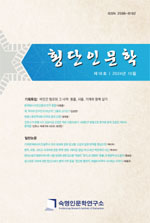비인간론은 21세기 근대인이 처한 다중적 위기 상황에서 인간과 비인간(nonhuman)의대칭성을 비판적으로 주장하는 논의 흐름이다. 비인간론은 인간의 진화에서 결정적인 역할을 비인간에게 부여하며 비인간과의 공진화를 주장하고, 나아가 동시대 담론들이 인간으로부터 비인간으로의 입장 전환을 요청한다. 비인간론은 정동이론, 미디어물질주의, 포스트휴먼 담론, 행위자연결망이론, 신유물론 등의 동시대 담론들과 교차하며, 한국에서는 주요 문헌들의 번역 소개와 더불어 꾸준히 인문사회학 분야에 영향을 미치고 있다. 한국인용색인(KCI)에 따르면 비인간 연구는 기후 위기, 젠더 차별, 감염병, 생태계 오염, 장애와 신체 변형, 인공지능, 동물 권리, 혐오 등과 같은 여러 주제로 2000년대 초부터 시작되어 2015년을 기점으로 급성장하고 있다. 비인간론은 인문학 분야의 연구가 주를 이루며 특히 KCI ‘기타 인문학’으로 분류된 분과 횡단적 연구 경향을 나타낸다.
Nonhumanism is a discourse that critically addresses the symmetrical relationships between humans and nonhumans in the context of the multi-layered crisis faced by Modern Humans in the 21st century. Nonhumanism attributes a decisive role to nonhumans in human evolution, advocates for co-evolution with nonhumans, and further calls for a shift in perspective from human to nonhuman in contemporary discourses. Nonhumanism intersects with contemporary discourses such as affect theory, media-materialism, posthuman discourse, actor-network theory, and new materialism, and it has been steadily influencing the field of humanities and social sciences through the translation and introduction of key texts in Korea. According to the Korean Citation Index (KCI), nonhuman studies, which began in the early 2000s addressing various topics such as climate crisis, gender discrimination, infectious diseases, ecosystem pollution, disability and bodily modification, artificial intelligence, animal rights, and disgut issues, have seen rapid growth since 2015. Nonhumanism primarily consists of research in the humanities and notably represents a trend of interdisciplinary research classified as 'other humanities' of KCI
1. 들어가는 말
2. 비인간론의 전개와 국내 수용
3. 한국에서 비인간론의 연구 동향
4. 나가는 말
참고문헌
(0)
(0)
